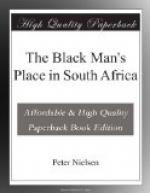The gravest, and, as I think, the most unjust of the many charges brought against these people by an unthinking public, is that the half-caste, wherever he is found, partakes of all the vices but of none of the virtues of his parents. When we remember that in the towns of South Africa the coloured people of necessity form the class that in the nature of things is peculiarly exposed to the temptations of prostitution and crime, then it becomes a matter for wonder that these people are as good and as law-abiding as indeed they are. People who know South Africa will admit that the coloured girl is from childhood exposed to the temptation of loose-living far more than either the Native girl in the kraal or the European girl in her home, and that the coloured boys and youths, by reason of the lack of the right kind of home-influence, which is the result of the unfavourable position in life of the bulk of their parents, naturally gravitate towards the levels where it becomes difficult to avoid crime. But despite all these adverse conditions that press so heavily against them the coloured people of South Africa, taken as a whole, stand justified of the calumnies uttered against them. The coloured people as a whole are not behind the whites in anything except in the lack of opportunity for education and self-improvement, a lack caused not by themselves, but by their inimical surroundings.
That many of the coloured people are immoral and shiftless need not be denied; the same may be said about the “poor whites,” who as a class perplex well-meaning legislators, but neither of these proved accusations give reason for thinking that either of these classes is inherently inferior to their more favourably-placed fellow-beings. We must always remember the tremendous handicap of being reared in the depressing surroundings of sloth and squalor. I have seen hundreds of poor whites—as white as any blond German could wish to be—who seemed utterly unfit for the complexities of civilised life, but I have also seen many of the children of these people who, after being removed from their home surroundings, have risen to positions of usefulness and trust, in which they have earned reputations for integrity and capacity. The trenchant saying of a British working-man is in point, “Treat a man like a dog and he will behave like a dog,” and the corollary is equally true, that if you treat a man as a man he will, as a rule, rise and quit himself like a man.
The familiar cry that once white blood is diluted with black it is “all up” with our civilisation is not convincing when we remember that the ground-work of this civilisation was built up by races that were not “pure white”; that the white civilisation during the dark ages sank to a very low level through no dilution of African blood, and that it was a mixed race, the Moors, who brought back into Europe the lost principles of Aristotelian science on which the crumbling structure of European culture was rebuilt. To




